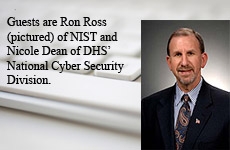Hubbard Radio Washington DC, LLC. All rights reserved. This website is not intended for users located within the European Economic Area.
On Air: Federal News Network
Cybersecurity
-
Congressman Gerry Connolly (D-VA) tells the DorobekINSIDER he has some concerns about the Pentagon\'s procurement changes.
September 17, 2010 -
A new investigation finds a managed services provider that specializes in offering a fee-based service sheds new light in to the growing commercialization of this criminal space.
September 17, 2010 -
Director Robert S. Mueller, III has named Shawn Henry as the executive assistant director (EAD) of the Criminal, Cyber, Response, and Services Branch (CCRSB). Mr. Henry will succeed Assistant Deputy Director T.J. Harrington. Mr. Henry most recently served as assistant director in charge of the FBI\'s Washington Field Office.
September 17, 2010 -
This week host Tom Temin talks with Ron Ross of NIST and Nicole Dean, deputy director of the National Cyber Security Division. September 16, 2010
September 16, 2010 -
According to a recent GAO report, there\'s now proof that national security and non-national security IT systems can work together effectively.
September 16, 2010 -
SCMagazineUS.com reports that the malware author who uses the handle \"iraq_resistance\" is believed to be part of the cyber-jihad organization \"Brigades of Tariq ibn Ziyad.\"
September 16, 2010 -
People exercise risk management, consciously and unconsciously, every day. Many of us drive on a daily basis. Some speed, and risk the chance of getting caught, while others are more conservative and drive the exact speed limit. We base our decision on whether or not to exceed the speed limit on the information available to us at the time, including our knowledge, past experiences, or the conditions we see in front of us. We weigh the risks against impacts and consequences, making decisions based upon our tolerance for the outcomes. The same is true for federal cyber risk management. Securing federal information and assets in cyberspace is the primary driver behind cybersecurity. Even so, other factors help define risk, including the potential for negative publicity if a cyber breach occurs, the impact to budget/performance plans if FISMA grades fall short, or the potential for investigations or congressional hearings if the burning issue of the day burns a bit too bright for too long. Federal cyber risk management fundamentally boils down to making risk decisions based upon an agency\'s risk tolerance - and the drivers behind an agency\'s tolerance vary across the federal government. Risk is defined as the likelihood of a future event that may have unintended or unexpected consequences. Federal agencies make the best cyber risk management decisions by using data and information to evaluate the agency\'s strengths and weaknesses for delivering on its cyber mission in the context of potential threats. Agencies must use information and data from various disparate sources across the enterprise to make these decisions, including audit log information, vulnerability data, asset information, the agency\'s regulatory compliance status, external and internal threat activity, human capital risks to the cybersecurity mission, and many more. As challenging as it may be for agencies to consume large volumes of disparate data, it is a challenge that is essential to overcome for agencies to make the best cyber risk management decisions. Is this achievable? Absolutely. The business intelligence movement established the foundation allowing agencies to minimize risk exacerbated by ad-hoc decision-making. Leveraging business intelligence capabilities for cybersecurity enables agencies to aggregate data across technical and organizational stovepipes and to provide agency cybersecurity leaders with mechanisms for making informed, risk decisions. By better understanding the cyber landscape, federal cybersecurity leaders can - much like our speeding driver example - understand \"how fast\" to drive and make better investment decisions when addressing enterprise cybersecurity risks.
September 16, 2010 -
The Performance Work Statement (PWS) defines the requirements for the Contractor to provide non-personal services for Information Technology (IT) support to the United States Army Chief Information Officer (CIO)/G6, Cyber Information Assurance Directorate.
September 16, 2010 -
Learn more in today\'s cybersecurity update
September 15, 2010 -
Fort Meade contractor Zytel to be acquired for $28.6M, Mozilla halts Firefox security updates
September 15, 2010 -
Learn more about what the 500-page guide details
September 14, 2010 -
Learn more in today\'s Cybersecurity Update
September 14, 2010 -
Anti-US hacker takes credit for \'Here you have\' worm
September 13, 2010
ASK THE CIO

THURSDAYS @ 10 & 2 p.m.
Weekly interviews with federal agency chief information officers about the latest directives, challenges and successes. Follow Jason on Twitter. Subscribe on Apple Podcasts or Podcast One.




